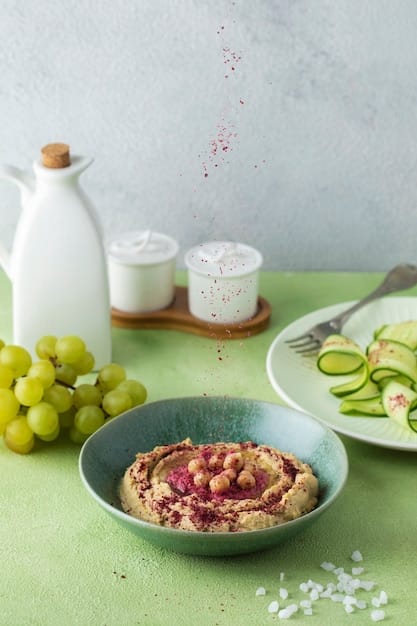Beat the Bloat: Strategies for Better Digestion & Comfort

Achieving optimal digestive health and alleviating discomfort, often referred to as “bloating,” involves a holistic approach encompassing dietary adjustments, lifestyle modifications, and an understanding of the intricate processes within the digestive system.
Living with constant digestive discomfort can significantly impact daily life, but understanding how to Beat the Bloat: Simple Strategies to Improve Digestion and Reduce Discomfort is crucial for reclaiming comfort and enhancing overall well-being. This guide delves into practical and evidence-based approaches to foster a healthier gut, offering actionable insights for a smoother digestive experience.
Understanding the Root Causes of Bloating and Discomfort
Bloating, characterized by a feeling of fullness, tightness, or swelling in the abdomen, is a common grievance, yet its origins are diverse and often interconnected. It is not merely a transient sensation but frequently signals an underlying imbalance within the digestive system. Unraveling these complex causes is the first step toward effective management and lasting relief.
One prevalent culprit is the excessive production or trapping of gas within the intestines. This can stem from the fermentation of undigested food particles by gut bacteria, a process exacerbated by certain dietary choices. Furthermore, air swallowing during eating or drinking, known as aerophagia, contributes significantly to gas buildup. The dynamic interplay between the food we consume and the microbial ecosystem within our gut dictates the volume and type of gases produced, directly influencing the sensation of bloating.
Dietary Triggers and Sensitivities
Specific foods are notorious for triggering bloating in sensitive individuals. These culprits often contain complex carbohydrates or fibers that are difficult to digest. Identifying these personal triggers is paramount in managing symptoms.
- FODMAPs: Fermentable Oligosaccharides, Disaccharides, Monosaccharides, and Polyols, found in many common foods, can be poorly absorbed and ferment in the gut, leading to gas and bloating.
- Lactose: A common sugar in dairy, lactose intolerance causes gas and discomfort when undigested lactose ferments.
- Gluten: While celiac disease is severe, non-celiac gluten sensitivity can also manifest with bloating and digestive upset.
Beyond these well-known triggers, individual sensitivities can range widely. Paying close attention to how specific foods make you feel is a powerful diagnostic tool, helping to tailor a diet that supports digestive ease.
Lifestyle Factors and Their Impact
Digestive health extends far beyond just food. Lifestyle choices play a pivotal role in regulating gut function and preventing discomfort. Stress, for instance, has a profound effect on the gut-brain axis, often manifesting as digestive upset, including bloating. When the body is under stress, it diverts resources away from digestion, slowing down gut motility and potentially leading to a buildup of gas and waste.
Insufficient physical activity is another contributing factor. Regular movement helps stimulate intestinal contractions, aiding the passage of food and waste through the digestive tract. A sedentary lifestyle can lead to sluggish digestion, increasing the likelihood of bloating and constipation. Addressing these lifestyle aspects is just as critical as dietary adjustments in achieving consistent digestive comfort.
Environmental factors and certain medications can also disrupt gut flora, impacting digestion and contributing to distension. Understanding your unique digestive ecosystem and its response to various stimuli is key to personalized relief.
The Power of Dietary Adjustments: What to Eat (and Avoid)
Optimizing your diet is arguably the most impactful strategy for alleviating bloating and improving digestion. It’s not about rigid restrictions but about mindful choices that support your gut’s natural functions. Making informed decisions about what to consume, and in what manner, can dramatically reduce discomfort and foster a balanced digestive environment.

Incorporating Gut-Friendly Foods
Embracing foods known for their digestive benefits can actively contribute to a healthier gut microbiome and smoother digestion. These foods often contain prebiotics, probiotics, or are naturally easy to digest.
- Fermented Foods: Sauerkraut, kimchi, yogurt, and kefir are rich in beneficial bacteria (probiotics) that help balance gut flora and improve digestion.
- High-Fiber Vegetables (Cooked): While some raw vegetables can be gas-producing, cooked versions of non-starchy vegetables like spinach, carrots, and zucchini are excellent sources of soluble fiber, aiding regularity without excessive gas.
- Lean Proteins: Fish, poultry, and plant-based proteins like tofu are generally easier to digest than red meat and can be incorporated without taxing the digestive system.
Hydration is another cornerstone of good digestion. Drinking sufficient water throughout the day helps to keep food moving through the digestive tract and prevents constipation, a common cause of bloating. Aim for at least eight glasses of water daily, and consider herbal teas known for their digestive properties, such as peppermint or ginger tea.
Foods to Limit or Avoid
Just as some foods support digestion, others are frequent culprits for discomfort. Identifying and limiting these can bring significant relief. It’s often a process of trial and error to pinpoint individual sensitivities.
- High-FODMAP Foods: Onions, garlic, beans, lentils, certain fruits (apples, pears), and artificial sweeteners are common triggers. A temporary low-FODMAP diet, guided by a healthcare professional, can help identify specific problematic foods.
- Carbonated Drinks: The bubbles in soda and sparkling water introduce excess air into the digestive system, leading to gas and bloating.
- Processed Foods: Often high in unhealthy fats, sugar, and artificial ingredients, processed foods can disrupt gut bacteria and slow down digestion, contributing to a feeling of fullness and discomfort.
While an elimination diet can be beneficial, it should be approached systematically to avoid unnecessary restrictions. Reintroducing foods slowly and observing reactions can help clarify which items are true triggers versus those that are simply less digestible for your system. The goal is to build a sustainable eating pattern that minimizes discomfort while providing adequate nutrition.
Lifestyle Hacks for Optimal Digestive Function
Beyond what you eat, how you live can profoundly influence your digestive health. Integrating simple, yet effective, lifestyle adjustments into your daily routine can significantly reduce bloating and enhance overall well-being. These practices often complement dietary changes, creating a holistic approach to gut comfort.
Mindful Eating Practices
The pace and manner in which we consume our meals are critical, yet often overlooked, aspects of digestion. Eating too quickly or while distracted can lead to swallowing excess air, a primary contributor to bloating. Moreover, rushed eating prevents proper chewing, making it harder for digestive enzymes to break down food effectively.
- Chew Thoroughly: Digestion begins in the mouth. Chewing food to a fine consistency eases the burden on your stomach and intestines. Aim for 20-30 chews per mouthful.
- Eat Slowly: Savor your meals. This allows your body to register fullness signals more accurately, preventing overeating, which can stretch the stomach and lead to discomfort.
- Avoid Talking While Eating: Speaking while chewing can lead to swallowing air, contributing to gas buildup.
Creating a relaxed eating environment can also improve digestion. When you’re stressed, your body diverts resources away from digestion, slowing it down. Taking a few deep breaths before a meal can prime your digestive system for optimal function.
Stress Management and Gut Health
The gut and brain are intricately linked via the gut-brain axis, meaning emotional stress can directly manifest as digestive problems. High stress levels can alter gut motility, increase sensitivity to pain, and even change the composition of gut microbiota, all contributing to bloating and discomfort. Managing stress isn’t just about mental well-being; it’s a vital component of digestive health.
- Mindfulness and Meditation: Practices like meditation and deep breathing exercises can reduce overall stress, thereby calming the digestive system. Even a few minutes a day can make a difference.
- Regular Exercise: Physical activity is a powerful stress reliever and also directly aids digestion by stimulating gut motility. Aim for low to moderate intensity exercise like walking, yoga, or swimming.
- Adequate Sleep: Sleep deprivation can exacerbate stress and disrupt digestive processes. Prioritize 7-9 hours of quality sleep per night to allow your body to rest and repair.
Finding healthy outlets for stress, whether it’s through hobbies, social connection, or time in nature, is essential for a happy gut. By actively managing stress, you’re not just improving your emotional state; you’re directly investing in your digestive comfort.
The Role of Probiotics and Prebiotics
A thriving and balanced gut microbiome is fundamental to efficient digestion and the prevention of bloating. Probiotics and prebiotics are two key players in nurturing this delicate ecosystem. Understanding their distinct roles and how to incorporate them into your diet can significantly enhance digestive comfort and overall health.
Probiotics: Beneficial Bacteria for Your Gut
Probiotics are live microorganisms, primarily bacteria, that provide health benefits when consumed in adequate amounts. They help colonize the gut with beneficial species, outcompeting harmful bacteria and contributing to a balanced microbial environment. A healthy balance of gut bacteria aids in food breakdown, nutrient absorption, and reduces gas production.
- Dairy-Based Sources: Yogurt, kefir, and certain cheeses are excellent natural sources of probiotics, often containing cultures like Lactobacillus and Bifidobacterium.
- Fermented Vegetables: Sauerkraut, kimchi, and pickles provide a rich diversity of beneficial microbes. Be sure to choose unpasteurized versions to ensure the live cultures are present.
- Probiotic Supplements: For those who struggle to get sufficient probiotics from food, or for specific conditions, high-quality supplements can be beneficial. Look for products with multiple strains and a high CFU count (colony-forming units).
The specific strains of probiotics can offer different benefits, so it’s sometimes helpful to vary your sources or consult with a healthcare professional to identify the best fit for your needs. Regular and consistent intake is key for maintaining their beneficial effects within the gut. Think of them as tiny workers helping your digestive factory run smoothly.
Prebiotics: Fueling Your Gut’s Good Bacteria
Unlike probiotics, prebiotics are non-digestible fibers that act as food for the beneficial bacteria already present in your gut. By nourishing these good microbes, prebiotics help them flourish, enhancing their probiotic activities and promoting a healthier digestive environment overall. They are essential for maintaining a robust and diverse microbiome.
- Garlic and Onions: These common ingredients are rich in inulin and fructooligosaccharides (FOS), powerful prebiotics.
- Bananas: Especially slightly green ones, contain resistant starch, which functions as a prebiotic.
- Oats and Barley: Excellent sources of beta-glucan, a soluble fiber with prebiotic properties that also helps regulate blood sugar.
Combining prebiotics with probiotics, a concept known as synbiotics, can amplify their benefits, creating a synergistic effect that further supports gut health. For example, enjoying yogurt with a banana or adding garlic to your vegetable dishes can provide both elements. However, for individuals sensitive to FODMAPs, some prebiotic-rich foods might initially cause discomfort, making careful introduction and monitoring essential.
Ultimately, a balanced diet rich in both diverse plant fibers and fermented foods is usually sufficient for most people to foster a healthy gut microbiome, naturally reducing issues like bloating and promoting digestive regularity.
When to Seek Professional Help for Persistent Bloating
While many cases of bloating can be managed with dietary and lifestyle adjustments, persistent or severe symptoms warrant professional medical attention. It’s crucial to distinguish between common, manageable discomfort and signs that might indicate a more serious underlying condition. Ignoring warning signs can delay necessary diagnosis and treatment.
Identifying Red Flag Symptoms
Certain symptoms, when accompanying bloating, should prompt a visit to a healthcare provider. These are indicators that your body may be signaling something beyond typical digestive upset.
- Persistent or Worsening Bloating: If bloating becomes constant, doesn’t respond to lifestyle changes, or progressively worsens over time, it’s a cause for concern.
- Unexplained Weight Loss: Losing weight without intentionally trying, especially in conjunction with digestive issues, can be a sign of an underlying medical condition.
- Severe Abdominal Pain: Intense, localized pain that doesn’t subside, or pain that radiates, should be evaluated promptly.
- Blood in Stool or Vomit: Any presence of blood in your excretions is an immediate red flag and requires urgent medical attention.
- Changes in Bowel Habits: Sudden and persistent changes in the frequency, consistency, or color of your stools (e.g., new onset constipation or diarrhea) warrant investigation.
- Difficulty Swallowing or Persistent Vomiting: These symptoms, especially if accompanied by bloating, could point to issues higher up in the digestive tract.
These “red flag” symptoms do not automatically mean a severe condition, but they underscore the importance of professional evaluation. Early diagnosis can lead to more effective treatment and better outcomes.
Consulting a Healthcare Professional
When seeking medical advice for bloating, a healthcare professional can help pinpoint the exact cause and recommend tailored solutions. They will typically begin with a thorough medical history and physical examination.
- Accurate Diagnosis: A doctor can differentiate between common indigestion, irritable bowel syndrome (IBS), small intestinal bacterial overgrowth (SIBO), celiac disease, inflammatory bowel disease (IBD), and rarer conditions.
- Personalized Treatment Plan: Based on the diagnosis, they can advise on specific dietary protocols, such as a low-FODMAP diet, prescribe medications, or recommend supplements.
- Referral to Specialists: If needed, your primary care physician can refer you to a gastroenterologist, dietitian, or other specialists who can provide more in-depth care.
They might also order specific tests, such as blood tests, breath tests (for SIBO or lactose intolerance), stool analysis, or imaging studies, to gain a clearer picture of your digestive health. Remember, self-diagnosing can be misleading; a professional opinion ensures you receive the most appropriate and effective care for your persistent bloating.
Long-Term Strategies for Sustainable Digestive Health
Achieving relief from bloating and discomfort is often a journey, not a destination. To maintain a happy, healthy gut over the long term, consistency in positive habits is far more effective than sporadic interventions. Sustainable digestive health requires a holistic and adaptive approach that evolves with your body’s needs.
Consistency in Diet and Lifestyle
The saying “you are what you eat” holds profound truth, especially concerning digestive well-being. Consistent adherence to a gut-friendly diet forms the bedrock of long-term comfort. This doesn’t imply an overly restrictive regimen, but rather a pattern of eating that prioritizes whole, unprocessed foods, ample fiber, and sufficient hydration. Regularly incorporating probiotics and prebiotics, either through food or supplements, helps maintain a balanced gut microbiome. Variety in your diet also ensures a diverse intake of nutrients beneficial for gut health.
Equally important is consistency in lifestyle habits. Regular physical activity, even moderate daily walks, supports gut motility and reduces stress. Prioritizing adequate sleep allows the digestive system to repair and function optimally. Stress management techniques, whether it’s mindfulness, yoga, or spending time in nature, should be integrated into your daily routine to mitigate the gut-brain axis’s negative influences. These sustained efforts create a resilient digestive system, less prone to disruptive symptoms.
Listening to Your Body’s Signals
One of the most powerful tools in maintaining digestive health is the ability to listen to and interpret your body’s unique signals. Each individual’s digestive system is distinct, reacting differently to foods, stress, and environmental factors. Developing this self-awareness allows for proactive adjustments rather than reactive responses to discomfort.
- Food Diary: Keeping a detailed record of what you eat and how you feel can uncover patterns and identify specific triggers for bloating or discomfort. Note symptoms, severity, and potential contributing factors.
- Mindful Eating: Pay attention to how different foods affect you in real-time. Notice sensations of fullness, ease of digestion, and any emerging discomfort.
- Stress Monitoring: Observe how stress levels correspond with your digestive symptoms. This insight can help you identify when stress management becomes particularly crucial.
This ongoing feedback loop enables you to fine-tune your diet and lifestyle proactively. If a new food seems to cause issues, you can temporarily remove it and reintroduce it carefully. If a period of high stress predictably leads to bloating, you can double down on stress-reducing activities. This adaptive approach ensures that your strategies for beating the bloat remain effective and truly personalized to your physiological needs, fostering sustainable digestive health and a greater sense of well-being.
| Key Strategy | Brief Description |
|---|---|
| 🍎 Dietary Adjustments | Identify and limit trigger foods; incorporate gut-friendly options like fermented foods and soluble fiber. |
| 🧘 Lifestyle Practices | Practice mindful eating, manage stress effectively, and ensure regular physical activity. |
| 🔬 Probiotics & Prebiotics | Cultivate a healthy gut microbiome by consuming beneficial bacteria and the fibers that feed them. |
| 🩺 Seek Professional Help | Consult a doctor for persistent or severe symptoms to rule out underlying conditions. |
Frequently Asked Questions About Bloating
▼
While instant relief varies, drinking peppermint or ginger tea can help relax digestive muscles and expel gas. Gentle walking can also stimulate gut motility. Avoiding carbonated drinks and chewing gum can prevent further air intake. For some, activating core muscles and simple stretches might provide temporary relief.
▼
Yes, stress significantly impacts the gut-brain axis, altering gut motility, increasing gut sensitivity, and potentially changing gut microbiota. Chronic stress can lead to symptoms like bloating, constipation, or diarrhea. Managing stress through techniques like mindfulness, yoga, or therapy is crucial for long-term digestive comfort.
▼
Common culprits include high-FODMAP foods (like onions, garlic, certain beans), carbonated beverages, artificial sweeteners, and sometimes dairy for those with lactose intolerance. However, individual triggers vary widely. Keeping a food diary can help identify your specific problematic foods for personalized dietary adjustments.
▼
Fiber is essential for regular bowel movements and can reduce bloating caused by constipation. However, consuming too much fiber too quickly, especially insoluble fiber, can initially increase gas and bloating. Aim for 25-30 grams daily from diverse sources, increasing intake gradually, and ensuring adequate hydration.
▼
Consult a doctor if bloating is persistent, severe, accompanied by unexplained weight loss, severe abdominal pain, changes in bowel habits, blood in stool, or difficulty swallowing. These could be signs of underlying medical conditions requiring professional diagnosis and treatment beyond simple lifestyle changes.
Conclusion
Addressing bloating and digestive discomfort is a journey that often begins with understanding the body’s intricate systems and making informed, consistent choices. By integrating dietary modifications, mindful eating practices, effective stress management, and embracing beneficial gut flora through probiotics and prebiotics, individuals can significantly improve their digestive health. The key lies in listening to your body’s unique signals and, when necessary, seeking professional guidance to ensure lasting comfort and well-being. These strategies collectively empower you to cultivate a happier, healthier gut, leading to a life with less discomfort and more vitality.





